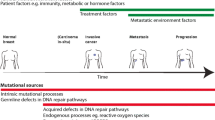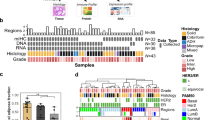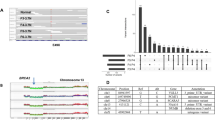Summary
In the past few years there has been an explosion in the number of patients diagnosed with hyperplastic breast disease andin situ breast cancer. Based on epidemiological data, these morphologically defined lesions may be categorized as those with little malignant potential (e.g. typical hyperplasia or proliferative disease without atypia [PDWA]), those with significant malignant potential which may already be “initiated” (e.g. atypical ductal hyperplasia [ADH]), and early “transformed” lesions which are malignant but not yet invasive (e.g. ductal carcinomain situ [DCIS]). They may represent sequential evolutionary stages in the ontogeny of invasive breast cancer, with each morphologically defined stage resulting from accumulating genetic changes culminating in a transformed clonal lineage capable of invasion and metastasis. Using loss-of-heterozygosity (LOH) analysis, we are studying the genetic changes associated with these lesions in archival tissue samples. 50% (6/12) of the proliferative lesions (PDWA and ADH) and 80% of the DCIS shared their LOH patterns with more advanced lesions from the same breast, strongly supporting a precursor/product relationship between these lesions and the cancers they accompany.
Similar content being viewed by others
References
Page DL, Dupont WD, Rogers LW, Rados MS: Atypical hyperplastic lesions of the female breast. A long term follow up study. Cancer 55:2698–2708, 1985.
Page DL, Dupont WD: Anatomical markers of human premalignancy and risk of breast cancer. Cancer 66:1326–1335, 1990.
Kintanar EB, Raju U: Further delineation of patterns of atypical ductal hyperplasia (ADH): an analysis of ADH patterns associated with intraductal and invasive breast carcinoma. Modern Pathol 4:12A (#59), 1991.
Cavenee WK, Dryja TP, Phillips RA, et al: Expression of recessive alleles by chromosomal mechanisms in retinoblastoma. Nature 305:779–784, 1983.
Friend SH, Bernards R, Rogel J, et al: A human DNA segment with properties of the gene that predisposes to retinoblastoma and osteosarcoma. Nature 323:643–646, 1986.
Lee W-H, Bookstein R, Hong F, et al: Human retinoblastoma susceptibility gene: Cloning, identification, and sequence. Science 235:1394–1399, 1987.
Lee W-H, Shew J-Y, Hong FD, et al: The retinoblastoma susceptibility gene encodes a nuclear phosphoprotein associated with DNA binding activity. Nature 329:642–645, 1987.
Cooper JA, Whyte P: RB and the cell cycle: Entrance or exit? Cell 58:1009–1011, 1989.
Call KM, Glaser T, Ito CY, et al: Isolation and characterization of a zinc-finger polypeptide gene at the human chromosome 11 Wilms' tumor locus. Cell 60:509–520, 1990.
Groden JA, Thliveris A, Samowitz W, et al: Identification and characterization of the familial adenomatous polyposis coli gene. Cell 66:589–600, 1991.
Nishisho I, Nakamura Y, Niyoshi Y, et al: Mutations of chromosome 5q21 genes in FAP and colorectal cancer patients. Science 253:665–669, 1991.
Fearon ER, Cho KR, Simons JM, et al: Identification of a chromosome 18q gene that is altered in colorectal cancers. Science 247:49–56, 1990.
Nigro JM, Baker SJ, Preisinger AC, et al: Mutations in the p53 gene occur in diverse human tumour types. Nature 342:705–708, 1989.
Baker SJ, Preisinger AC, Jessup JM, et al: p53 gene mutations occur in combination with 17p allelic deletions as late events in colorectal tumorigenesis. Cancer Res 50:7717–7722, 1990.
Callahan R, Campbell G: Mutations in human breast cancer: an overview. J Natl Cancer Inst 81:1780–1786, 1989.
Coles C, Thompson AM, Elder PA, et al: Evidence implicating at least two genes on chromosome 17 in breast carcinogenesis. Lancet 336:761–763, 1990.
Cropp CS, Lidereau R, Campbell G, et al: Loss of heterozygosity on chromosomes 17 and 18 in breast carcinoma: Two additional regions identified. Proc Natl Acad Sci USA 87:7737–7741, 1990.
Devilee P, van den Broek M, Kuipers-Dijkshoorn N, et al: At least four different chromosomal regions are involved in loss of heterozygosis in human breast carcinoma. Genomics 5:554–560, 1989.
Devilee P, Cornelisse CJ, Kuipers-Dijkshoorn N, et al: Loss of heterozygosity on 17p in human breast carcinomas: defining the smallest common region of deletion. Cytogenet Cell Genet 53:52–54, 1990.
Larsson C, Bystrom C, Skoog L, et al: Genomic alterations in human breast carcinomas. Genes, Chromosomes & Cancer 2:191–197, 1990.
Mackay J, Elder PA, Porteous DJ, et al: Partial deletion of chromosome 11p in breast cancer correlates with size of primary tumour and oestrogen receptor level. Br J Cancer 58:710–714, 1988.
Sato T, Tanigami A, Yamakawa K, et al: Allelotype of breast cancer: Cumulative allele losses promote tumor progression in primary breast cancer. Cancer Res 50:7184–7189, 1990.
Allred DC, O'Connell P, Fuqua SAW, Osborne CK: Immunohistochemical studies of early breast cancer evolution. Breast Cancer Res Treat (this issue)
Wright DK, Manos MM: Sample preparation from paraffin embedded tissues.In: Innes MA, Gelfand DH, Sninsky JJ, White TJ (eds) PCR Protocols. Academic Press, San Diego, 1990, pp 153–158.
Author information
Authors and Affiliations
Rights and permissions
About this article
Cite this article
O'Connell, P., Pekkel, V., Fuqua, S. et al. Molecular genetic studies of early breast cancer evolution. Breast Cancer Res Tr 32, 5–12 (1994). https://doi.org/10.1007/BF00666201
Issue Date:
DOI: https://doi.org/10.1007/BF00666201




